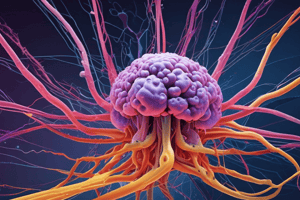Podcast
Questions and Answers
What do mechanical receptors detect?
What do mechanical receptors detect?
- Pressure, movement, and tension (correct)
- Sound waves and electromagnetic radiation
- Temperature and light
- Chemical signals and odors
What do chemical receptors detect?
What do chemical receptors detect?
- Chemical signals, such as odors and tastes (correct)
- Pressure and movement
- Sound waves and electromagnetic radiation
- Temperature and light
What do electromagnetic receptors detect?
What do electromagnetic receptors detect?
- Temperature and taste
- Sound waves and chemical signals
- Pressure and movement
- Electromagnetic radiation, such as light (correct)
What kind of stimuli do mechanical receptors detect?
What kind of stimuli do mechanical receptors detect?
Where do some animals have chemical receptors, apart from the nose and mouth?
Where do some animals have chemical receptors, apart from the nose and mouth?
What do electromagnetic receptors detect?
What do electromagnetic receptors detect?
Flashcards are hidden until you start studying
Study Notes
Types of Receptors
- Mechanical receptors detect mechanical stimuli such as touch, pressure, vibration, and stretching.
- Chemical receptors detect chemical stimuli such as molecules in the air (smell) and in food and drinks (taste).
- Electromagnetic receptors detect electromagnetic radiation such as light and electromagnetic fields.
Mechanical Receptors
- Mechanical receptors detect stimuli such as touch, pressure, vibration, and stretching.
Chemical Receptors
- Apart from the nose and mouth, some animals have chemical receptors in other locations, such as antennae, tongues, and feet.
- Chemical receptors detect chemical stimuli such as molecules in the air (smell) and in food and drinks (taste).
Electromagnetic Receptors
- Electromagnetic receptors detect electromagnetic radiation such as light and electromagnetic fields.
Studying That Suits You
Use AI to generate personalized quizzes and flashcards to suit your learning preferences.




